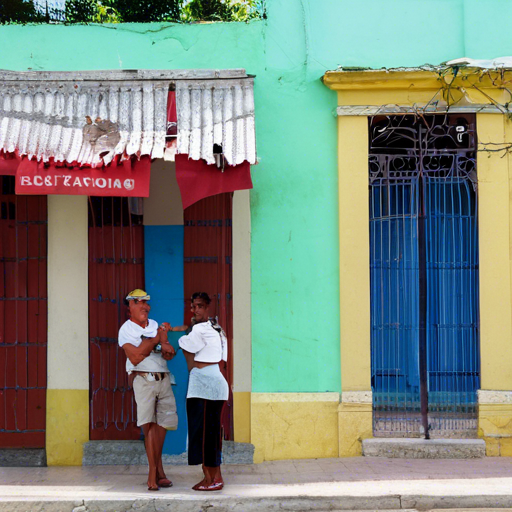navigating social norms in cuba: tips for respectful interactions

Navigating Social Norms in Cuba: Tips for Respectful Interactions
As we embark on our journey to Cuba, understanding and respecting the local social norms is paramount. This guide aims to provide essential tips for respectful interactions, ensuring a culturally enriching experience. Whether you're a seasoned traveler or a first-time visitor, these insights will help you navigate the vibrant Cuban society with ease and grace.
Understanding Cuban Culture
Cuban culture is a rich tapestry woven from Spanish, African, and indigenous influences. The island's history, music, dance, and cuisine reflect this diverse heritage. To truly appreciate and respect Cuban social norms, we must first understand the cultural context.
Key Cultural Values
Several core values underpin Cuban society:
- Family: Family is the cornerstone of Cuban life. Extended families often live together, and family gatherings are frequent and lively.
- Hospitality: Cubans are known for their warmth and hospitality. Visitors are often treated like family.
- Respect: Respect for elders and authority figures is deeply ingrained in Cuban culture.
Language and Communication
Spanish is the official language of Cuba. While many Cubans speak some English, especially in tourist areas, making an effort to speak Spanish is greatly appreciated. Simple phrases like "Hola" (Hello), "Gracias" (Thank you), and "Por favor" (Please) can go a long way in fostering goodwill.
Non-Verbal Communication
Non-verbal cues are equally important. Cubans are expressive and use gestures to communicate. A friendly handshake, a warm smile, and maintaining eye contact are essential for respectful interactions.
Social Etiquette in Cuba
Understanding social etiquette is crucial for respectful interactions in Cuba. Here are some key points to consider:
Greetings and Introductions
When meeting someone for the first time, a firm handshake and a warm smile are customary. Among friends and family, a kiss on the cheek is a common greeting. It's polite to address people using their titles (Señor, Señora) followed by their last name.
Dining Etiquette
Dining in Cuba is a communal affair, often involving extended family and friends. Here are some tips to keep in mind:
- Wait to be seated: Wait for the host to indicate where you should sit.
- Don't start eating immediately: Wait for everyone to be served before starting your meal.
- Compliment the food: Complimenting the host on the meal is a sign of respect and appreciation.
Gift Giving
Gift giving is a common practice in Cuba, especially when visiting someone's home. Small, thoughtful gifts such as flowers, chocolates, or souvenirs from your home country are appreciated. Avoid overly expensive gifts, as they may cause discomfort.
Respecting Local Customs
Respecting local customs is essential for a positive experience in Cuba. Here are some customs to be aware of:
Religious Practices
Cuba is predominantly Catholic, but other religions are practiced as well. When visiting religious sites, dress modestly and behave respectfully. Avoid taking photos during religious ceremonies without permission.
Music and Dance
Music and dance are integral to Cuban culture. Participating in local music and dance events is a great way to connect with the culture. However, be mindful of the context and follow the lead of locals.
Public Behavior
Public displays of affection are common in Cuba, but it's important to be mindful of your surroundings. In more conservative settings, such as rural areas or religious sites, it's best to be discreet.
Practical Tips for Travelers
Here are some practical tips to ensure respectful interactions during your stay in Cuba:
Dress Code
Cubans take pride in their appearance and often dress smartly. While casual attire is acceptable in many settings, dressing neatly and modestly is a sign of respect. When visiting religious sites or attending formal events, opt for more conservative clothing.
Photography
Photography is generally welcomed in Cuba, but it's courteous to ask for permission before taking photos of people, especially in rural areas. Avoid photographing military installations or personnel.
Tipping
Tipping is customary in Cuba, especially in the service industry. A tip of 10-15% is standard in restaurants, and small tips are appreciated for services such as taxi rides and hotel staff assistance.
Conclusion
By understanding and respecting Cuban social norms, we can foster meaningful connections and enrich our travel experiences. Whether it's through learning a few Spanish phrases, participating in local customs, or simply showing respect and appreciation, our efforts will be warmly received by the Cuban people.
FAQ
| Question | Answer |
|---|---|
| What is the official language of Cuba? | Spanish is the official language of Cuba. |
| Is tipping expected in Cuba? | Yes, tipping is customary, especially in the service industry. A tip of 10-15% is standard in restaurants. |
| What should I wear when visiting religious sites? | Dress modestly and conservatively when visiting religious sites in Cuba. |
| Can I take photos of people in Cuba? | It's courteous to ask for permission before taking photos of people, especially in rural areas. |
For more travel tips and advice, visit this travel guide.
```